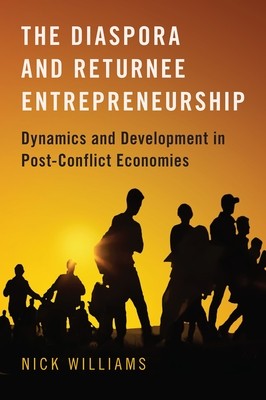
- We will send in 10–14 business days.
- Author: Nick Williams
- Publisher: Oxford University Press, USA
- ISBN-10: 0190911875
- ISBN-13: 9780190911874
- Format: 15.5 x 23.1 x 1.5 cm, hardcover
- Language: English
- SAVE -10% with code: EXTRA
Reviews
Description
With increased movements of people around the world, the role of transnational economic activity is becoming ever more significant. Yet little is understood about the motivations and contribution of those who return to their homeland to undertake entrepreneurial activity.
The Diaspora and Returnee Entrepreneurship analyzes the role that the diaspora play when returning as entrepreneurs to their homeland. Nick Williams investigates "returnee entrepreneurs," or people who have moved away from their home country, lived as part of the diaspora, and later returned home to live, invest, or both. Based on exhaustive research, this book examines the motivations and activities of these returnee entrepreneurs coming back to challenging homeland economies. Williams draws on evidence from the post-conflict economies of Bosnia, Herzegovina, Kosovo, and Montenegro, all of which are characterized by relatively weak institutional environments. His analysis shows how return to complex environments is often not based on perceived profit opportunities but is due to an emotional attachment informing investment decisions. Exploring questions of isolation versus assimilation, institutional involvement, and personal networking, the book covers more than just the policyapproaches that extract higher levels of remittances and studies broad and varied approaches being used by governments around the world, specifically those in post-conflict economies. Through an in-depth study of the dynamics of return and entrepreneurship, this book shows that concerted efforts need to be made to improve perceptions of state political institutions among the diaspora to secure further assimilation, investment, and prosperity. Williams proves that by understanding the challenges and opportunities associated with diaspora return entrepreneurship, more effective strategies can, and should, be put in place.
EXTRA 10 % discount with code: EXTRA
The promotion ends in 20d.20:54:25
The discount code is valid when purchasing from 10 €. Discounts do not stack.
- Author: Nick Williams
- Publisher: Oxford University Press, USA
- ISBN-10: 0190911875
- ISBN-13: 9780190911874
- Format: 15.5 x 23.1 x 1.5 cm, hardcover
- Language: English English
With increased movements of people around the world, the role of transnational economic activity is becoming ever more significant. Yet little is understood about the motivations and contribution of those who return to their homeland to undertake entrepreneurial activity.
The Diaspora and Returnee Entrepreneurship analyzes the role that the diaspora play when returning as entrepreneurs to their homeland. Nick Williams investigates "returnee entrepreneurs," or people who have moved away from their home country, lived as part of the diaspora, and later returned home to live, invest, or both. Based on exhaustive research, this book examines the motivations and activities of these returnee entrepreneurs coming back to challenging homeland economies. Williams draws on evidence from the post-conflict economies of Bosnia, Herzegovina, Kosovo, and Montenegro, all of which are characterized by relatively weak institutional environments. His analysis shows how return to complex environments is often not based on perceived profit opportunities but is due to an emotional attachment informing investment decisions. Exploring questions of isolation versus assimilation, institutional involvement, and personal networking, the book covers more than just the policyapproaches that extract higher levels of remittances and studies broad and varied approaches being used by governments around the world, specifically those in post-conflict economies. Through an in-depth study of the dynamics of return and entrepreneurship, this book shows that concerted efforts need to be made to improve perceptions of state political institutions among the diaspora to secure further assimilation, investment, and prosperity. Williams proves that by understanding the challenges and opportunities associated with diaspora return entrepreneurship, more effective strategies can, and should, be put in place.


Reviews